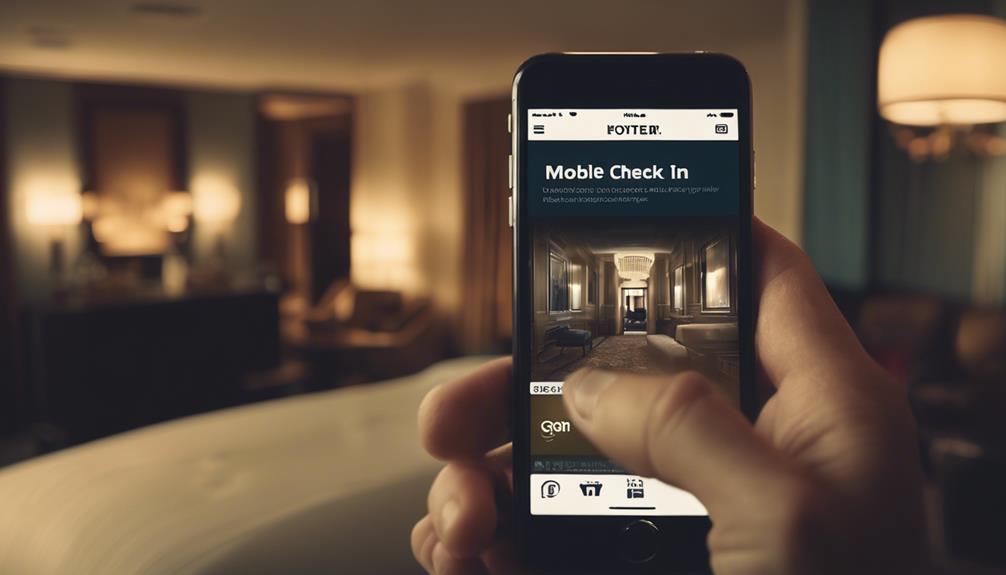Mobile Marketing Strategies for Today's Hotels
Imagine your hotel as a ship navigating the vast ocean of digital marketing. Just as sailors rely on stars to guide them, hotels today can utilize mobile marketing strategies to steer through the competitive hospitality landscape.
From understanding guest behaviors to enhancing personalized experiences, the potential for growth is immense.
So, how can you ensure your hotel stays ahead in this dynamic realm, where trends evolve at the speed of a click?
Key Takeaways
- Prioritize mobile booking options for streamlined reservations.
- Analyze guest behavior trends to tailor services effectively.
- Leverage social media for authentic engagement and brand awareness.
- Implement mobile-friendly website design for optimal user experience.
Importance of Mobile Marketing
Mobile marketing is a crucial component for hotels seeking to engage with tech-savvy travelers and boost their competitive edge in the digital landscape. In today's fast-paced world, the shift towards mobile booking is undeniable. Research indicates that over 50% of travelers use mobile devices to book accommodations, making it essential for hotels to optimize their digital presence for this platform. By prioritizing mobile booking options, hotels can streamline the reservation process, enhance user experience, and ultimately increase bookings.
Moreover, effective mobile marketing strategies are instrumental in fostering customer engagement. Through personalized offers, targeted promotions, and interactive content, hotels can create meaningful connections with guests, driving loyalty and repeat business. Leveraging mobile technologies such as push notifications and location-based services enables hotels to deliver relevant information in real-time, enhancing the overall guest experience. By understanding and adapting to the mobile preferences of travelers, hotels can stay ahead of the curve and maximize their reach in an increasingly digital world.
Understanding Guest Behavior Trends
Amidst the evolving landscape of hospitality, understanding guest behavior trends is paramount for hotels aiming to tailor their services effectively and stay competitive. By analyzing guest preferences and engagement analytics, hotels can gain valuable insights into what drives their guests' choices and satisfaction levels. Moreover, studying booking patterns enables hotels to anticipate demand fluctuations and optimize pricing strategies accordingly. Communication strategies play a pivotal role in engaging with guests throughout their journey, from pre-booking inquiries to post-stay feedback.
| Guest Preferences | Engagement Analytics |
|---|---|
| – Personalization | – Tracking website interactions |
| – Sustainability initiatives | – Monitoring social media interactions |
| – In-room technology preferences | – Analyzing email open rates |
Understanding these trends empowers hotels to tailor their offerings to match guest expectations, leading to improved guest satisfaction and loyalty. Leveraging data-driven insights allows for targeted marketing campaigns and personalized experiences, ultimately enhancing the overall guest experience.
Leveraging Social Media Platforms
You can maximize your hotel's online visibility by tapping into the vast social media reach available today.
Collaborating with influencers can help you access niche audiences and drive bookings.
Additionally, leveraging user-generated content can build trust and authenticity among potential guests.
Social Media Reach
To maximize your hotel's online visibility and engagement, harness the power of various social media platforms. Engage your audience effectively by implementing smart strategies that align with social media algorithms. Here are some key tactics to enhance your hotel's social media reach:
- Leverage User-Generated Content: Encourage guests to share their experiences and reviews, boosting credibility and authenticity.
- Interactive Polls and Quizzes: Drive engagement by creating interactive content that encourages participation and feedback.
- Live Videos and Stories: Utilize live features to provide real-time updates, behind-the-scenes glimpses, and interactive sessions with your audience.
Influencer Collaborations
Incorporating influencer collaborations into your hotel's social media strategy can significantly amplify brand awareness and engagement among target audiences. By forming influential partnerships, you can tap into a wider audience and enhance guest engagement.
Collaborative promotions with influencers can create a buzz around your hotel, driving traffic and increasing brand visibility. Ensure that the influencers you choose align with your brand values and target demographic for maximum impact.
Track metrics such as reach, engagement, and bookings to measure the success of your influencer campaigns. Leveraging the power of social media through strategic influencer collaborations can elevate your hotel's online presence and foster a strong connection with potential guests.
User-Generated Content
Enhancing your hotel's social media presence through user-generated content on various platforms can cultivate authentic guest experiences and drive increased engagement with your target audience. Leveraging customer testimonials and engagement can significantly boost credibility and trust in your hotel's brand.
Content curation plays a vital role in showcasing the authenticity of these user-generated posts, providing potential guests with a real glimpse into the experiences they can expect. By actively encouraging guests to share their stories and feedback, you create a community-driven narrative around your hotel that resonates with a broader audience.
This approach not only builds a sense of belonging but also helps in establishing long-term relationships with your guests based on genuine interactions and shared experiences.
Implementing Mobile-Friendly Website Design
Revamp your hotel website with responsive design to ensure seamless user experiences on all devices.
Prioritize user-friendly navigation to enhance engagement and drive conversions.
Optimizing for mobile won't only improve user satisfaction but also boost your hotel's online visibility and bookings.
Responsive Web Design
To ensure optimal user experience and engagement on mobile devices, prioritize the implementation of responsive web design for your hotel website. Responsive design adapts your site to any screen size, improving usability and conversion rates. It also boosts your SEO efforts by providing a mobile-friendly experience.
- Enhanced User Experience: Delight guests with a seamless browsing experience on all devices.
- Improved Mobile Optimization: Increase visibility and accessibility for potential customers searching on mobile.
- Higher Engagement Rates: Capture the attention of users with a visually appealing and easy-to-navigate mobile site.
User-Friendly Navigation
Implementing intuitive navigation features on your hotel's mobile website can significantly enhance user experience and drive increased engagement rates. Improved functionality and a seamless experience are crucial for capturing and retaining the attention of potential guests.
By ensuring that your website is easy to navigate on mobile devices, you can guide users efficiently towards essential information such as booking options, room details, and amenities. Utilize clear menu structures, prominent call-to-action buttons, and simplified forms to streamline the user journey.
Conduct thorough testing to identify and address any potential usability issues. Enhancing user-friendly navigation not only improves customer satisfaction but also increases the likelihood of conversions, ultimately boosting your hotel's online performance.
Personalizing Guest Experiences
Enhancing guest interactions through tailored experiences is the cornerstone of successful mobile marketing strategies for hotels. By personalizing services based on guest preferences, hotels can create memorable stays that drive loyalty and positive reviews. Here are key strategies to help you excel in personalizing guest experiences:
- Data Analytics: Utilize guest data to understand preferences and behaviors, allowing you to offer personalized recommendations and services that cater to individual needs.
- Interactive Communication: Implement chatbots or messaging services to engage with guests in real-time, providing assistance, recommendations, and personalized offers throughout their stay.
- Customized Amenities: Offer guests the ability to choose room features, amenities, and services before arrival through mobile apps, ensuring their preferences are met to enhance satisfaction.
Utilizing Location-Based Marketing
By leveraging geospatial data intelligence, hotels can craft hyper-targeted marketing campaigns that resonate with guests based on their physical location. Utilizing geofencing campaigns and Beacon technology, hotels can send personalized offers and messages to guests when they enter a specific area, such as the hotel lobby or nearby tourist attractions. This proximity marketing approach allows hotels to engage with guests in real-time, enhancing their overall experience.
Location-based offers are a powerful tool in attracting guests to on-site amenities like restaurants, spas, or special events. By analyzing guests' movements through Beacon technology, hotels can tailor promotions and discounts based on their current location within the hotel premises. This personalized touch not only increases guest satisfaction but also boosts revenue for the hotel.
Incorporating location-based marketing strategies into your mobile marketing plan can drive customer engagement and loyalty. By delivering relevant content at the right time and place, hotels can create memorable experiences that keep guests coming back. Embrace the power of location intelligence to stand out in today's competitive hospitality industry.
Incorporating Mobile Payment Options
Explore the seamless integration of mobile payment options to streamline transactions and enhance guest convenience in the hospitality industry. Embracing mobile wallet integration can revolutionize the way your hotel conducts transactions, offering guests a secure and convenient payment method right at their fingertips. Contactless payments have become a prominent hospitality industry trend, providing a faster and safer way for guests to settle their bills without the hassle of physical cards or cash.
Key Points:
- Mobile Wallet Integration: Implementing mobile wallet options allows guests to make payments swiftly and securely through their smartphones, enhancing their overall experience.
- Customer Convenience: Offering contactless payment methods aligns with the current trend in the hospitality industry, catering to guests' preferences for quick and efficient transactions.
- Streamlined Transactions: By incorporating mobile payment options, hotels can streamline their payment processes, leading to increased efficiency and improved guest satisfaction.
Harnessing the Power of Mobile Apps
Harness the dynamic capabilities of mobile apps to elevate guest engagement and personalize experiences in the realm of hotel services. Mobile apps are a powerful tool for hotels to enhance app engagement and drive mobile bookings. By creating a user-friendly interface, offering exclusive deals, and providing seamless booking processes, hotels can increase guest satisfaction and loyalty.
Implementing features such as mobile check-in/out, room service requests, and personalized recommendations based on guest preferences can significantly improve the overall guest experience. These personalized interactions not only make guests feel valued but also increase the likelihood of repeat bookings.
Furthermore, push notifications can be utilized to send targeted messages to guests, such as special promotions or event updates, encouraging them to book directly through the app. This direct communication channel enhances engagement and fosters a sense of community between the hotel and its guests.
Measuring Mobile Marketing Success
To truly maximize the impact of your mobile marketing strategies for hotels, it's essential to effectively measure the success of your campaigns and initiatives. Understanding the performance of your mobile marketing efforts is crucial for making informed decisions and optimizing future strategies.
Here are key aspects to focus on:
- Conversion Rates: Analyzing conversion rates can provide valuable insights into the effectiveness of your mobile marketing campaigns. By tracking how many users take the desired action, whether it's making a reservation or signing up for promotions, you can gauge the success of your strategies.
- Data Analysis: Utilizing data analysis tools can help you uncover patterns, trends, and customer behaviors that can inform your mobile marketing strategy. By diving into the data, you can identify what's working well and areas that may need improvement.
- ROI Tracking: Monitoring return on investment (ROI) is essential for evaluating the financial performance of your mobile marketing efforts. Calculating the revenue generated against the costs incurred can help you measure the profitability of your campaigns and make adjustments as needed.
Conclusion
You've learned about the key mobile marketing strategies for hotels today.
Did you know that 51% of travelers use their smartphones to book accommodations?
By understanding guest behavior, leveraging social media, and personalizing experiences, hotels can increase bookings and guest satisfaction.
Remember to measure success through analytics to continually optimize your mobile marketing efforts.
Stay ahead of the competition by embracing the power of mobile in the hospitality industry.






